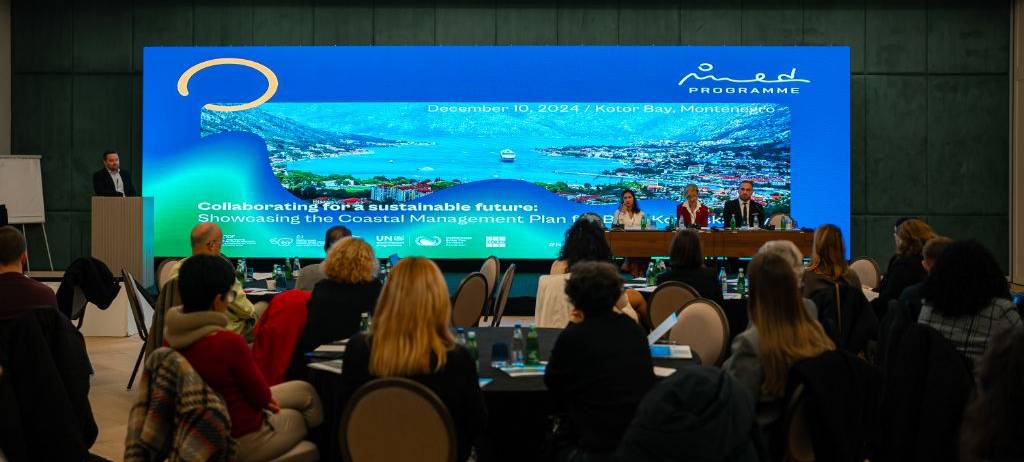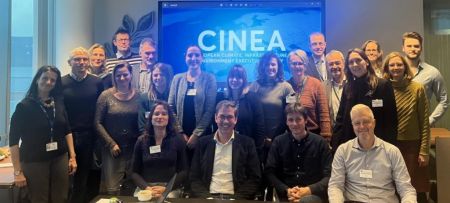Climate change adaptation and environmental protection are not obstacles to socio-economic development; rather, they are essential pillars for building sustainable and prosperous coastal communities across the Mediterranean. This was the key message of the “Collaboration for a Sustainable Future” conference held in Kotor on December 10, 2024, during which the Coastal Zone Management Plan for Boka Kotorska Bay was presented. Covering the municipalities of Kotor, Tivat, and Herceg Novi, this plan represents a critical step in Montenegro's National Strategy for Integrated Coastal Zone Management.
Key challenges and solutions discussed
The conference brought together representatives from various institutions, NGOs, experts, and donor organizations to identify priority actions and opportunities for implementing the plan. Dynamic panel discussions addressed pressing issues outlined in the plan, such as the need for improved cooperation among stakeholders, sustainable urban planning, and innovative financing models. These discussions aimed to prioritize measures and elevate conversations to a higher level, facilitating the practical application of solutions on the ground.
In his opening speech, Zoran Dabetić, State Secretary from the Ministry of Ecology, Sustainable Development, and Northern Development, emphasized the importance of acknowledging the challenges ahead. “To realize this plan's full potential, we must work together to ensure its complete implementation so that it does not remain merely a document on paper. This will require ongoing cooperation among all levels of government, national and local institutions, the expert community, and, of course, citizens as the ultimate beneficiaries of this valuable area,” Dabetić stated.
Daria Povh, PAP/RAC Director, highlighted that this plan provides a platform for strategic partnerships among academia, associations, businesses, and local and national authorities. “Vertical cooperation is essential, as the costs of climate adaptation are significant, and no single entity can handle them alone,” said Povh.
Addressing human impacts on the coastline
Nearly 48% of Boka Kotorska Bay’s coastline has been altered by human activities, including road construction and urban development. During the first panel session, Milica Manojlović, Secretary of Spatial Planning in Tivat, underscored the urgency of harmonized urban planning to counteract the effects of rapid urbanization and climate change. “Population growth and intensified construction are putting immense pressure on infrastructure, while issues like coastal “concretization,” droughts, fires, and floods present significant challenges,” she noted.
Moreover, it was emphasized that, without intervention, economic losses in areas such as Morinj could exceed €105.3 million by 2100 due to rising sea levels, according to estimates from Metroeconomica.
However, Montenegro is not alone in facing these challenges. Drawing from successful examples, Giancarlo Gusmanoli from the MedSea Foundation shared insights into effective coastal management initiatives, focusing on Sardinia’s Oristano Bay as a key model.
Local partnerships as a cornerstone
During the second panel discussion, representatives from EKO Fond, EnvPro, NGO Green Home, and the UN Environment Programme Global Environment Facility (UNEP/GEF) highlighted the importance of local initiatives and partnerships. Duška Ljiljanić of EKO Fond commended municipal collaborations on waste management and underwater cleanup projects. Ana Katnić from EnvPro emphasized nature-based solutions, pointing to Ulcinj’s ecosystem revitalization efforts as a model for preserving sensitive areas.
Atifa Kassam, Task Manager at UNEP/GEF, proposed innovative financial mechanisms to support the plan’s implementation. “Climate resilience insurance, debt-for-climate swaps, and carbon trading markets could significantly boost funding for adaptation efforts,” she suggested.
The conference concluded with a clear message: The time to act is now. Unified efforts are needed to ensure a sustainable future for Boka Kotorska Bay. This urgency was underscored by extensive coverage in national and local media, with several articles highlighting the conference's key discussions and outcomes (links available below).
Developed under the leadership of PAP/RAC on behalf of UNEP/MAP, the plan's development was funded by the Global Environment Facility (GEF) as part of the MedProgramme.
For further details, visit gefmed.paprac.org.


